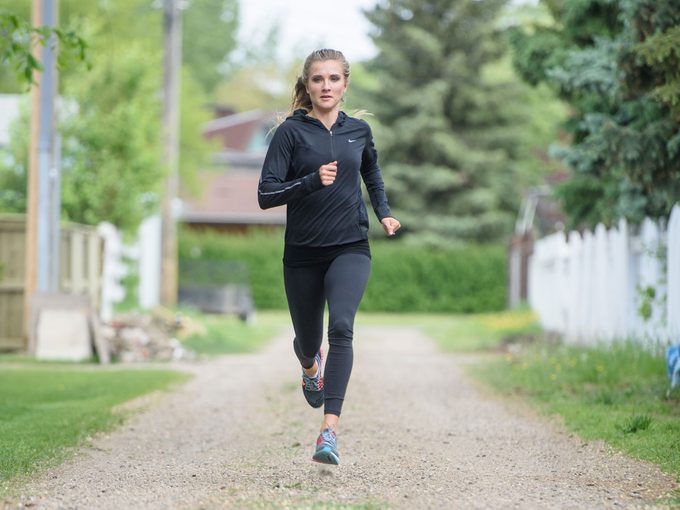Heptathlete Brianne Theisen-Eaton: In Her Prime and Training for Rio
She’s looking forward to competing at the 2015 Pan Am Games in Toronto, but what’s really on Canadian heptathlete Brianne Theisen-Eaton’s mind is the 2016 Summer Olympic Games in Rio

Source: Image: Derek Mortensen, 2015
Brianne Theisen-Eaton participated in her first heptathlon in grade 9, and hasn’t looked back. The 26-year-old from Humboldt, SK, made her Olympic debut at the 2012 Olympic Games in London where she finished 11th. Since then, she’s been training hard and has the hardware to prove it. Silver medals at the 2013 IAAF World Championships and the 2014 IAAF Word Indoor Championships, and a gold medal at the 2014 Commonwealth Games in Glasgow are just a few of her accomplishments. She’s also recently been named an ambassador (along with her mom, Kim) to the P&G Thank You Mom campaign, a program which launched in 2012 as part of a global Olympic platform.
Now, having recently set the Canadian record in the heptathlon at the May 2015 Hypo-Meeting in Gotzis, Austria (which she also won), Theisen-Eaton has got her eye on the next prize: a gold medal at the 2016 Summer Olympic Games in Rio. We sat down with her just before the 2015 Pan Am Games in Toronto to talk about her recent record, how she balances family and training, and how she’s preparing for Rio.
Best Health: Congratulations on your recent record at the Hypo-Meeting. How did you feel afterward?
Brianne Theisen-Eaton: It was shocking to be honest. I knew I was in good shape, I knew I was sharp and ready to go. But I didn’t think it would come together so well. There are a lot of aspects to my training aside from just the physical running and exercise. There’s also nutrition and mental preparation, recovery and just learning how to handle myself in competition. I’ve been working hard on all of those aspects and I think it’s finally all starting to come together. I’m more mature and I’ve been doing it long enough. It’s exciting from the standpoint that I still have a year and a half before the Olympics and [my result at the Hypo-Meeting] would have easily got second in London [at the 2012 Olympics]. I can see that it’s a real possibility now. An Olympic medal is a real possibility ‘ and gold is a possibility. So, that’s kind of what I’m in disbelief about.
BH: Your husband Ashton (2012 Olympic Champion and world record holder in the decathlon) wasn’t able to compete at the Hypo-Meeting, but he was there. What did he say to you after your results?
BTE: He doesn’t say a lot; he just gets a smile on his face and says something like ‘Good job.’ But I know from the way he says it that it means so much more. He’s there every day, and we see what we do at home [to prepare]. So when he says ‘Good job’ it’s not like when my family says ‘Good job.’ He doesn’t have to say anything more because I just know that he’s proud and happy for me.
BH: How do you balance time with each other off the field? Is it harder because you both have these insane schedules or is it easier because you both understand the preparation required for this sport?
BTE: It’s a little bit of both. I actually sometimes feel like we put our marriage on the backburner. We’re both so focused on our careers and we know this [level of sport] is only going to last so long, so if that means not going on date nights I think it’s helpful because we both understand what we’re trying to do. And we’re both OK with it and we know it’s only temporary and that eventually we can be that normal couple. It would be difficult for me to do what I’m doing’training and travelling all the time’and be married to somebody who doesn’t understand my motivation or what I put into [my sport] emotionally.
BH: Is there a sport you dislike or find most challenging?
BTE: I’m struggling with javelin. There’s a mental component that I am still figuring out but there are also technical issues. I just don’t have a feel for it. When I do something wrong I don’t know what it is that I’ve done and I have to look to my coach. I’m the most frustrated with javelin but I’m also the most optimistic because I know ‘ and you can mark my words on this ‘ if I win an Olympic gold medal in Rio, it’ll be because of the javelin. I have to get that figured out. If I don’t, I just don’t think [gold] will be possible. Fixing my javelin could mean 150 to 200 points more; it’s a lot of points. I see it as a challenge. It’s exciting to me because’you can ask anyone who’s really good at something’it’s boring when you’re constantly the best, so this is something I’m looking at as a challenge. I know that my competitors are out there training hard and I have to figure this out in order to win. It’s exciting to me.
BH: What are you looking forward to about the Pan Am Games in Toronto? You mentioned that you think you’ll be a bit more relaxed.
BTE: Right. I’m not doing the hep (heptathlon), which will allow me to soak in the whole experience. When you go to the Olympics, or an event like it, it’s a tense, really emotional feeling. For me to be only doing one or two events at the Pan Am Games takes some pressure off. I’m excited to go into the village and, obviously I want to do well, but [it’s a] different mindset of being able to both have fun and compete. It’ll be really fun to have the crowd involved and use that energy from them.
BH: Do you have any pre-competition rituals?
BTE: Just little ones, like I don’t like to think about very much before I go to the track because I’ll get too nervous. I’ll watch a movie or a series on Netflix while I’m getting ready. When I’m in Europe, Netflix doesn’t work so I’ll search full episodes on YouTube and watch those.
BH: What’s your beauty routine like with you being so active?
BTE: You know I always see people [at events] hat have eyelashes on and their nails done and jewellery and lipstick and I always think, ‘I don’t have time for that!’ But I think for me with the hep, I’m competing for two days straight, and by the end of the first and then second day I just look like a bomb went off. [Laughs.] My hair has sand in it and I’m sweaty. Normally I wear my hair in a ponytail. High jump is frustrating because I’ll have just gotten my hair looking nice and then I high jump and my ponytail gets all pushed to the side. I’ll also put some mascara on and lip gloss and a moisturizer with sunscreen in it.
BH: What’s next for you as you continue to train for Rio?
BTE: I’m already feeling a different pressure this year than I have in years past. Now that I’ve gotten a good score I know my training is on track but it’s also scary because I’m 26, next year I’ll be 27, so this is my Olympics to win a medal. If I don’t, I’m not saying that it’s not possible in 2020, but it’ll be harder because now I’m kind of in my prime. Thinking about that and saying I want to win a gold medal is scary but if I didn’t say that, it would be a lie because obviously I’m trying to win a gold medal. I’ve been working with a sports psychologist and something she’s taught me is that if you can do everything every single day to set yourself up for the best possible chance, then if you go to the Olympics and you get the silver, you can look back and say ‘every single thing I did was looking towards this gold medal and I’m just not as good as the person who beat me.’ You have to be OK with that. So that’s what I’ve been trying to do. Everything I do each day is focused on getting that gold medal and if I get the silver or bronze, or don’t medal at all, at least I can say, ‘I did everything I possibly could and it just wasn’t meant to be.’ I think I would be content and happy with that, but I just want to set myself up for the best chance possible.




